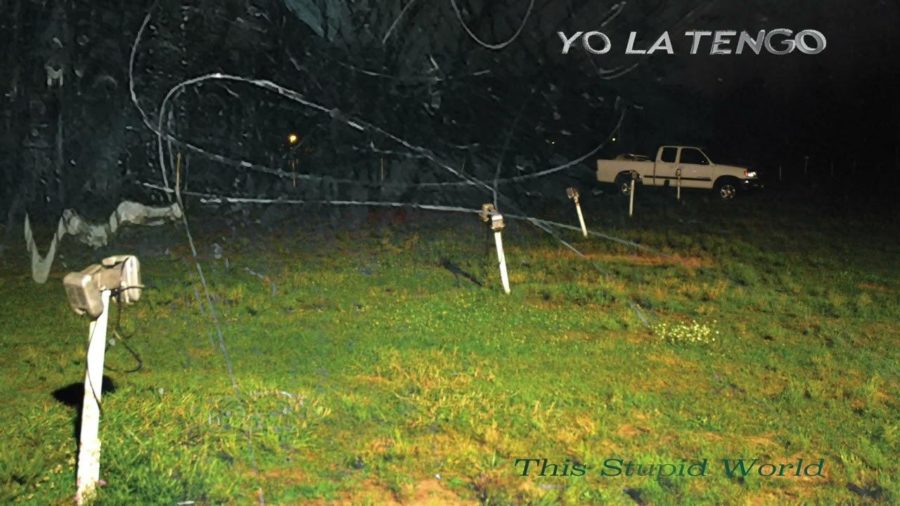A Harmony of Industrial Noise: “This Stupid World”
In their 17th studio album “This Stupid World,” Yo La Tengo returns to their melancholic, noise pop roots.
February 17, 2023
On Feb. 10, the gloomy masters of melancholic longing, Yo La Tengo, released their 17th studio album in nearly 40 years. The album calls back to many of the themes that made the band successful in the 1990s, and a mainstay in the playlists of many millennials still. Michael Hann of The Guardian perfectly captures the essence of their spirit, describing them as “the quietest loud band, or loudest quiet band in the world.” In their blending of harsh, and at times dissonant instrumentals, the band’s soft vocals and new-age ballads lull fans into a world of introspection.
Composed of husband and wife Ira Kaplan (lead singer and guitarist) and Georgia Hubley (on drums and vocals), as well as bassist James McNew, the group formed in Hoboken, New Jersey in 1984. Since then, they have produced such seminal works as their 1993 release “Painful,” 2000’s “And Then Nothing Turned Itself Inside-Out” and what many consider to be their masterpiece, “I Can Hear the Heart Beating as One” in 1997. Many outsiders, and even fans of the group, might wonder how they could keep their signature style of music going for so long without it becoming repetitive. However, the band’s music is constantly evolving, even when they’re performing an already recorded song. There is always room for improvisation in their music, due to their heavy instrumentals, which can often be slightly adapted. This allows the band to not only release new music, but also make twists on old classics.
The album opens with their final single release, “Sinatra Drive Breakdown,” a seven-minute long introduction to the overarching theme of darkness they were exploring before the pandemic halted its production. Other singles from the album include “Fallout” and “Aselestine,” the first one being a more upbeat song—by Yo La Tengo’s standards. The latter feels like one of many examples of Hubley reading us poetry, the instrumentals giving us something to hold onto while we eagerly wait for her voice to come back between verses. “Tonight’s Episode” lends vocal duty to McNew, while feedback-driven guitar captures our attention until disrupted by chant-like background vocals and catchy piano chords. In the back half of the album, “Apology Letter” and “Brain Capers” back-to-back show the band’s fearless ability to mix levels of noise and genre without bleeding ideas together, and losing the full emotion of each individual song. The album closes with “Miles Away,” a track with elements of electric pop that sounds like an even more depressed Moby cover group. Despite this, the album is an astonishing accomplishment for the threesome, and certainly deserves more widespread praise than it will likely receive.
The entire album feels like something out of a forgotten era, a time in which this kind of noise pop dominated the alternative and indie musicscape. It also feels like something out of the golden era of Yo La Tengo—as if fans could ever get tired of listening to their previously released music, and needed something fresh. Fortunately for fans, this album proves they are still ahead of their time as originals and continue to make up phenomenal music, showing no sign of slowing down. This feeling of nostalgia can be experienced all across the country as they go on tour to promote their album, including a Mar. 22 stop in Cleveland at the Beachland Ballroom.



